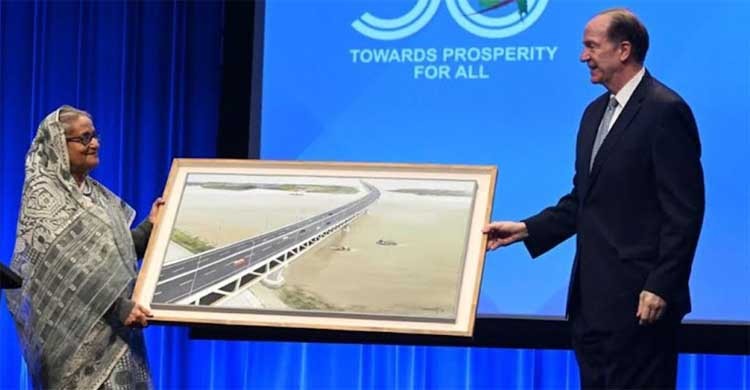Stay with us in implementing future physical & social mega projects: PM to WB
02 May 2023, 09:49 am | Updated: 05 April 2025, 04:01 am

Prime Minister Sheikh Hasina on Monday urged the World Bank and other development partners to find out viable alternatives to help economies like Bangladesh cope better with the stress, caused by the pandemic, armed conflicts and climate emergency.
“The ongoing global multiple crises, caused by the pandemic, armed conflicts and climate emergency, have put most developing economies under serious stress. Some of our development partners have chosen to increase their lending costs and interest rates, which detract from their core mandate,” she said
She made the suggestion with other fours while addressing the Plenary Session of the 50 Years Partnership between Bangladesh and the World Bank at the Preston Auditorium of World Bank Headquarters with its president David R. Malpass in the chair.
In the second suggestion, Hasina said that Bangladesh is preparing for smooth and sustainable graduation from the UN LDC status in 2026. In this regard, she requested the World Bank to support Bangladesh’s human capital and institutional capacity development programmes for a smooth transition.
“The critical IDA window needs to be preserved and continued,” she said.
In the rhird suggestion, she mentioned that Bangladesh has aligned UN SDGs with its national aspiration to become an upper middle-income country by 2031.
“There is an urgent expectation that the World Bank and other development partners deliver increased, concessional and innovative financing for SDG implementation,” she said.
The prime minister in her fourth suggestion said Bangladesh hopes that the World Bank’s enhanced engagement in climate action would help address the wide gaps in financing under the Paris Agreement.
“We would stress the importance of equal distribution of financing between climate mitigation and adaptation,” she added.
In her final point, she said Bangladesh will continue to invest in infrastructure and logistics for realising its vision to become a high-income economy by 2041.
“I would expect the World Bank to engage in both our physical and social mega-projects in the coming years,” she said.
Hasina said that Bangladesh will continue to move forward undeterred. “My presence here signals that we maintain our trust in the World Bank.
Our success in the next two decades would depend on our collective ability and efforts to overcome the emerging challenges in a just and sustainable manner,” she said.
She also put emphasis on remaining united towards making millions of people still lagging behind live a happy life in Bangabandhu Sheikh Mujib’s ‘Sonar Bangla’.
In 2009, she said that after assuming the office her government pledged to build a ‘Digital Bangladesh’ by 2021.
“In the last one and a half decade, Bangladesh has gone through significant change, thanks to political stability and sound macro-economic fundamentals.”
She mentioned that In 2015, the World Bank classified Bangladesh as a lower-middle income country. In 2021, the UN declared it eligible for graduation from the LDC status for the second time.
“We successfully managed the COVID-19 pandemic through an economic stimulus package worth USD 26.9 billion, and free-of-cost mass vaccination.”
The PM said that the completion of the Padma Multi-Purpose Bridge with country’s own resources and its inauguration last year is perhaps the best example of Bangladesh’s resilience and achievement.
She said that Bangladesh has today emerged as the world’s 35th largest economy, with a nominal GDP of USD 460 billion while its economy has been growing at an average rate of 6 percent in the last one decade. It reached up to 8.15 percent just before the pandemic. This has led to notable increase in per capita income to the tune of USD 2,824 in 2022.
She also mentioned that the overall poverty rate has reduced to 18.7 percent in 2022 from 41.5 percent in 2006.
“During this time, we have increased our budget allocation for social protection by 40 times, constituting 2.5 percent of our GDP.”
Just last year, she said, our government announced the decision to launch a Universal Pension Scheme.
She mentioned that under her flagship Ashrayan project, the government has provided free-of-cost homes to nearly five million people along with income-generating skills and support.
She said, 99.7 percent of households have come under electricity coverage, while the power generation capacity has increased eight-times to over 25,000 MW between 2006 and 2022.
Stay with us in implementing future physical & social mega projects: PM Hasina to WB
She said that she has made affordable and quality healthcare a priority by setting up 18,000 community-level health facilities across the country.
“Our government remains focused on enhancing inclusive and transformative education, with the Fourth Industrial Revolution in mind,” she said.
She mentioned that the female participation rate in the labour force is higher compared to those of its regional peers.
“Our government has recently taken a decision to reflect women’s household work in our national GDP.”
Sheikh Hasina said that Bangladesh has emerged as a global role-model in disaster management and preparedness.
“We invested heavily in early warning systems, disaster-resilient infrastructure, and community-based interventions. Bangladesh is also a living laboratory of climate adaptation, featuring a number of nature-based and technological solutions.”
She also invites the World Bank and other development partners to join hands in implementing the projects under our Bangladesh Delta Plan 2100.
“Our government attaches importance to developing Bangladesh as a regional connectivity, aviation and logistics hub," she said.
She said that the government has set a target to establish 100 Special Economic Zones (SEZs), which will generate an estimated ten million jobs by 2030.
“Bangladesh has already established itself as a reliable partner in the global supply chain. We now host more than half of the world’s hundred best green factories.”
The prime minister said that the government has launched its next vision to build a ‘Smart Bangladesh’ by 2041.
“It aims at achieving digitally empowered citizens; faceless government services; a knowledge-based, cashless economy; and a rights-based, just and inclusive society," she said.
PM Hasina said that Bangladesh has offered shelter to the forcibly displaced Rohingya from Myanmar over the last four decades.
“Their number has reached 1.2 million since their expulsion following mass atrocity crimes in August 2017.”
She said that Bangladesh has been working with the UN and other international agencies to secure their safe, dignified and voluntary repatriation to Myanmar, but not a single person has returned till to-date.
“The situation is getting increasingly difficult for us, with growing security implications for the wider region,"she warned
She thanked the World Bank for joining Bangladesh’s humanitarian endeavour and for the USD 590 million grant for the Rohingya and their impacted communities.
World Bank President David Malpass, Former Chief Economist and Senior Vice President of the World Bank Kaushik Basu, World Bank Country Director for Bangladesh & Bhutan Abdoulaye Seck, World Bank's Vice President for the South Asia Region Martin Raiser also spoke.
A video on 50 years partnership between Bangladesh & WB showed. A deal of 2.5 billion dollars to implement five projects was signed between Bangladesh and the WB.





















